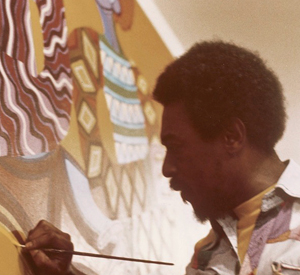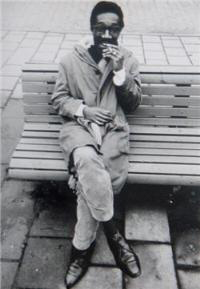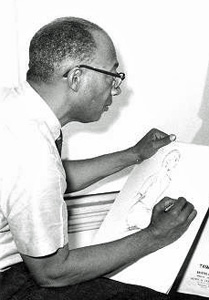Related Research Articles

Laura Wheeler Waring was an American artist and educator, most renowned for her realistic portraits, landscapes, still-life, and well-known African American portraitures she made during the Harlem Renaissance. She was one of the few African American artists in France, a turning point of her career and profession where she attained widespread attention, exhibited in Paris, won awards, and spent the next 30 years teaching art at Cheyney University in Pennsylvania.

Paul Farwell Keene Jr. was a Philadelphia-area artist and teacher whose work helped raise the visibility of Black American artists. As a self-described "abstract realist," his story reflects both the accomplishments and the difficulties of African American artists in the 20th century.

Allan Randall Freelon Sr., a native of Philadelphia, US, was an African American artist, educator and civil rights activist. He is best known as an African American Impressionist-style painter during the time of the Harlem Renaissance and as the first African American to be appointed art supervisor of the Philadelphia School District.

Moe Albert Brooker was an African American painter, educator and printmaker. An abstract artist, he used vivid colors, lines, stripes, squares and circles to infuse a feeling of improvisational jazz in his works. Brooker was an internationally known artist whose paintings are in the collections of major museums and other institutions.
Raymond Steth, born Raymond Ryles, was a Philadelphia-based graphic artist recognized for his paintings and lithographs on the African-American condition in the mid-20th century, often through scenes of rural life and poverty. Working under the Works Progress Administration's graphics division in the 1930s and 1940s, Steth's art covered a range of topics and emotions from pleasurable farm life to protest and despair.
John Edward Dowell Jr. is an American printmaker, etcher, lithographer, painter, and professor of printmaking at the Tyler School of Art at Temple University.
The Pyramid Club was formed in November 1937 by African-American professionals for the "cultural, civic and social advancement of Negroes in Philadelphia." By the 1950s, it was "Philadelphia's leading African-American social club."

Charles Robert Searles was an African American artist born in Philadelphia in 1937. He studied at the Pennsylvania Academy of Fine Arts and was active from the 1960s until he died in 2004 from complications from a stroke.
Louise D. Clement-Hoff was an American painter and educator who specialized in oil painting, pastel and drawing of human figures and still lifes.

Samuel Joseph Brown Jr. (1907–1994) was a watercolorist, printmaker, and educator. He was the first African American artist hired to produce work for the Public Works of Art Project, a precursor to the Work Progress Administration's Federal Art Project. Brown often depicted the lives of African Americans in his paintings. He worked primarily in watercolor and oils, and he produced portraits, landscapes and prints.

Roland Ayers (1932–2014) was an African American watercolorist and printmaker. He is better known for his intricate drawings – black-ink figures of humans and nature intertwined in a dream-like state against a neutral backdrop. A poet and lover of jazz and books, he expressed his poetry through images rather than words, he often noted, and considered his artwork to be poetry.

Walter Edmonds (1938-2011) was an American artist best known for the 14 murals he painted with Richard J. Watson for the Church of the Advocate in Philadelphia.

Reginald Gammon (1921-2005) was an American artist and member of the African American artist's collective, Spiral.
Martina Johnson-Allen is an American artist and educator.

Humbert Howard was an American artist and art director of the Pyramid Club.
James Brantley is an American artist known for his painting.
We Speak: Black Artists in Philadelphia, 1920s–1970s was an art exhibition held at the Woodmere Art Museum from September 26, 2015 through January 24, 2016. It included artists from Philadelphia who were active from the 1920s through the 1970s. Many of those artist were invlolved with the Pyramid Club and other local organizations. The exhibit included paintings, photographs, prints, drawings and sculpture from the New Negro movement of the 1920s, the Works Progress Administration print works of the 1930s and the Civil rights era.
James Atkins is an American artist known for his paintings of Philadelphia. Mainly self-taught, Atkins attended art classes at Samuel S. Fleisher Art Memorial art school in South Philadelphia.

John T. Harris (1908-1972) was an American artist and educator. He was born in Philadelphia. He attended the Philadelphia Museum School of Industrial Art and the Tyler School of Art and Architecture. He taught art at the Cheyney State Teachers College.
Edward Ellis Hughes (1940-2017) was an American painter. He was born in Philadelphia in 1940. He attended the Pennsylvania Academy of the Fine Arts and the Cheyney University of Pennsylvania where he earned his Bachelor of Fine Arts degree.
References
- 1 2 "Allan L. Edmunds". Smithsonian American Art Museum. Retrieved 4 June 2022.
- ↑ "Allan Edmunds". Brandywine Workshop and Archives. Retrieved 4 June 2022.
- ↑ "Our History". Brandywine Workshop and Archives. Retrieved 5 June 2022.
- ↑ "Allan L. Edmunds, Everyday Genius". Da Vinci Art Alliance. Retrieved 5 June 2022.
- ↑ "Allan Edmunds". National Gallery of Art. Retrieved 5 June 2022.
- ↑ "Reflections on Silkscreen". Philadelphia Museum of Art. Retrieved 5 June 2022.
- ↑ "Edmunds, Allan L." Woodmere Art Museum. Retrieved 5 June 2022.
- ↑ "We Speak: Black Artists in Philadelphia, 1920s-1970s". Woodmere Art Museum. Retrieved 4 June 2022.